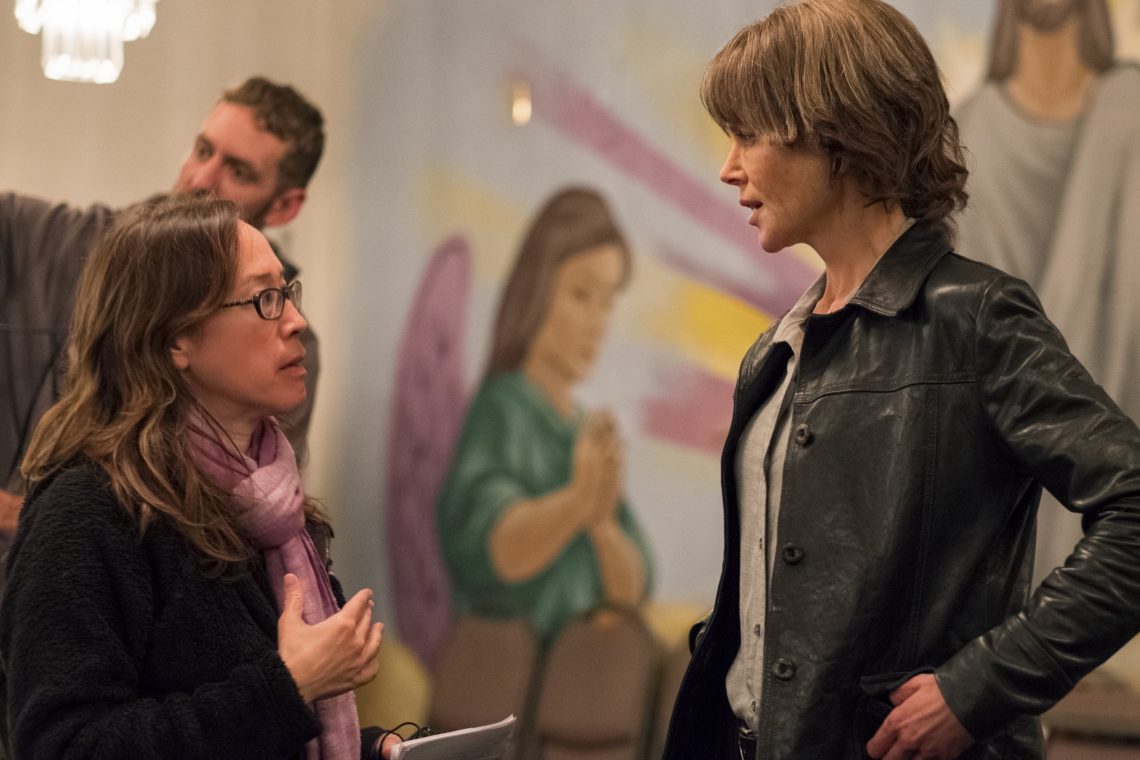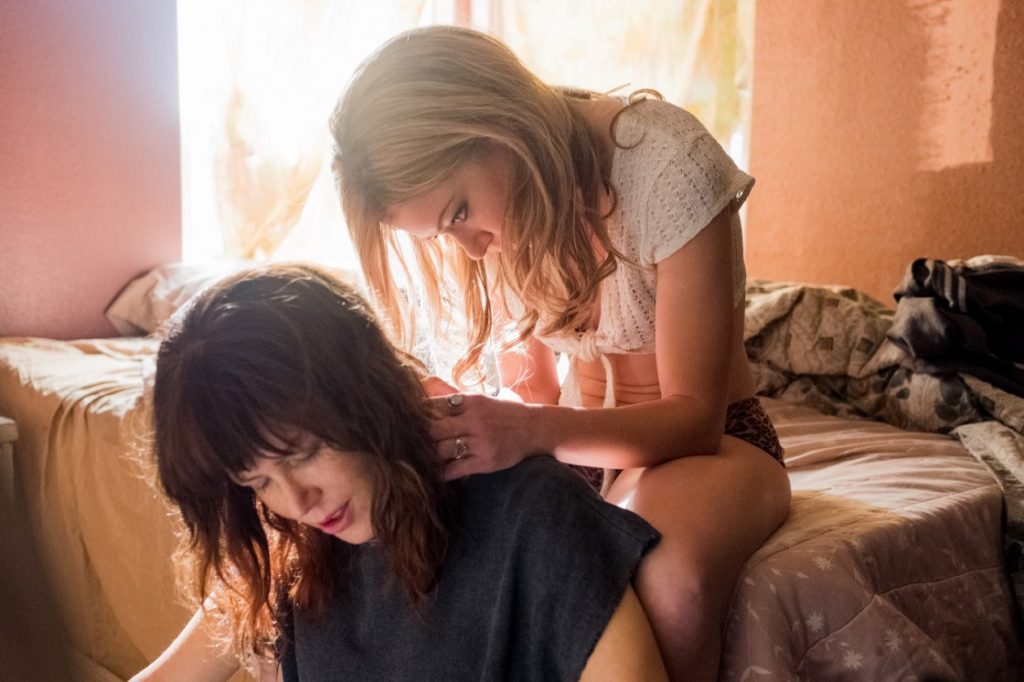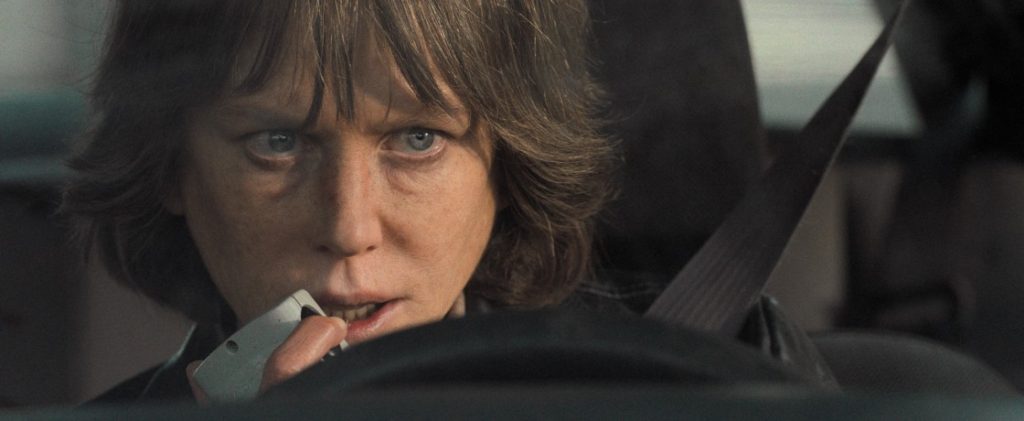
Destroyer Interview: Karyn Kusama
“It’s not just this fantasy that we have to think of every idea and as directors be the only keeper of decisions. In fact, it’s many peoples vision of the vision and the director is corralling all of those opinions and offerings and skills that need to be applied to the final execution of that vision. Ultimately, it’s truly a team effort.”
Karyn Kusama’s path in Hollywood has not been a straight shot.
Her debut movie, Girlfight, was lauded at Sundance Film Festival, opening doors to major studio films with major studio budgets. Unfortunately, this promising career move was stalled by a lack of communication — complete creative control just out of reach.
Kusama was left in ‘movie jail’ until The Invitation, an independent film written by Phil Hay and Matt Manfredi, where she was given a collaborative team and freedom over her vision of the film. This has opened up directing opportunities on big television shows like Billions and Halt and Catch Fire.
We spoke with Kusama about how she retains creative control of her projects, the resurgence of Jennifer’s Body and her new film DESTROYER.
Tell us about yourself and how you got involved in filmmaking.
Karyn Kusama: I went to film school at the Tish School of the Arts at NYU at the Undergraduate level and grew up in St. Louis, Missouri. Moved to New York in 1986 and spent about 17 years there before moving out to L.A.
After film school, I made my first feature film, probably 9 years after graduating. I was extremely fortunate to have my first film premiere at the Sundance Film Festival in 2000 and win the Directing Prize and share the Grand Jury Prize in the narrative competition which was an incredible opportunity for me. I was able to get the film distributed all around the world which was another amazing opportunity.
From there it has just been an ongoing process of making movies and trying to get movies made and failing sometimes, succeeding other times. But after almost two decades of doing this, I would say that I’m largely interested in low budget approaches that allow me as much creative control as is possible.
Particularly after making Destroyer, which is the second of a kind of L.A. trilogy that I’m making with my writing collaborators Phil Hay and Matt Manfredi. I’m really interested in trying to make work that’s local, that I can shoot in L.A. and still have a family, still see my son for dinner at night. And be making movies that feel personal, that feel like my movies, as opposed to just the execution of somebody else’s vision or idea.

You mentioned that you worked on big-budget movies but are now shifting back to lower budget indie films. Can you talk about the differences between the two and why you enjoy working on the latter?
KK: Yeah, I mean my first film was a low budget feature that was financed independently, Girlfight, but then I made two studio films that were to some degree a much more difficult experience. My second film Æon Flux was a 62 million dollar Sci-Fi movie and my third film Jennifer’s Body was about 16–17 million dollars, also at a studio.
Both films had to answer to a lot more agendas within the studio. There was a lack of communication, I would say, between the filmmakers, the financing and the marketing departments, the executive administrations of those companies. In different ways, the movies suffered for it.
Æon Flux suffered on the literal and creative level in that the movie was cut by a whole different team of people and was essentially taken away from me before it was given back. It was kind of like playing in the playground and having a toy and then having it get stomped on and sent back to me to fix, which was a distressing and difficult experience for me.
Jennifer’s Body, I was largely happy with as a film but then it was marketed to a very different audience then it was designed to play for. The film was conceived by women to be largely marketed to a female audience and the studio decided to market it largely to a male audience which was a mistake.
For me, when I make movies independently and with less money at stake —although I should add that whenever it’s anybody’s money it’s a lot of anxiety and the only way to feel truly like you’re not answering to the money is for it to be your own, and in that case, you’re answering to your own money [laughs] — it is a less difficult road to just making my movie.
Though it was much more challenging, the production schedule was much shorter in the case of both The Invitation and Destroyer then it would be if it were at a studio, it was much more creatively a compete and consistent statement from me. And so for that reason, I lean more towards independently financed films but that being said of course I want resources and I want the support that comes with studio films.
If I found the right relationship I would be open to exploring it but I’m just hoping to find the right balance between healthy partners and those resources.
Jennifer’s Body has had a kind of resurgence as a ‘cult film,’ and seems to have found it’s intended audience. How do you feel about that?
KK: I’m really excited that people are reevaluating the movie and giving it a second chance. Or even better, just discovering it on their own, free from all framing and marketing that came from the original release of the film that really twisted its meaning and distorted its themes. I’m very excited to know that there are people getting to appreciate the movie now. It’s super cool.
When you make a film are you going into it hoping people take a specific thing out of it or are you excited to see the reactions?
KK: That’s an interesting question, I mean I think I ultimately do want to create certain effects in the audience but I begrudgingly have come to terms with the fact that audiences take your movie and interpret it the way they want to interpret it. There’s a certain amount out of my control when it comes to the films that I’ve made and how they are perceived.
My hope as a filmmaker is that I can lead the audience towards certain feelings and reactions or experiences as viewers but the person in me that’s trying to mature [laughs] into my adulthood has to accept the fact that I can’t control how people respond to my work.

Can you tell us about Destroyer and how you got involved with the project?
KK: Sure. So Destroyer originated with a script that my husband Phil Hay and his writing partner Matt Manfredi wrote and conceived of. They had always been talking about this female detective story with a really unusual narrative structure, that over the course of the film reveals that the detective is essentially investigating herself.
They brought me into the outlining phase of their writing process so that I could see how their thinking had been developing scene to scene and sequence to sequence. That allowed me the opportunity to tell them as a director what areas of the film I was really interested in expanding or going further with, or areas that I thought we could refine or streamline.
This is our third collaboration together, we also did The Invitation and Æon Flux, and it’s just a really great partnership between us. They are incredibly brilliant writers and definitely feminist allies to me. I feel so thankful to be able to have a partnership with them that can speak to the spirit of collaboration and corporation, which I actually think is the biggest component of filmmaking.
It’s not just this fantasy that we have to think of every idea and as directors be the only keeper of decisions. In fact, it’s many peoples vision of the vision and the director is corralling all of those opinions and offerings and skills that need to be applied to the final execution of that vision. Ultimately, it’s truly a team effort and I’m thankful that Phil and Matt essentially wrote that script with me in mind. I think it creates a more whole, complete artistic statement.
Keep up to date with Destroyer: Facebook | Twitter | Instagram | Website
*This post was originally featured on The MUFF Society.*

